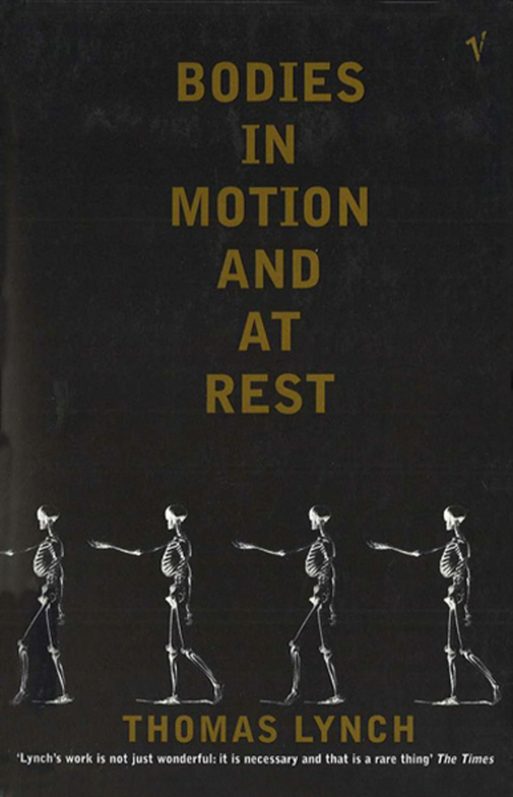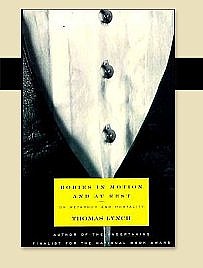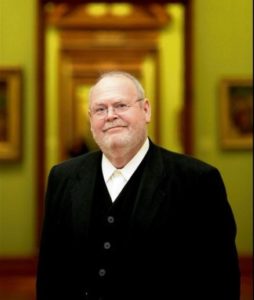 Thomas Lynch is both a published poet and funeral director, and these two facets of his persona are on full display in his book of essays, “Bodies in Motion and at Rest.” Published in 2000, the collection contains discussions and personal musings about life and death and Lynch’s experiences as a funeral director. Life lessons, personal anecdotes and discussions of society are all fodder used to display his inner thoughts. Lynch beautifully uses metaphor and comedy in his quips about death, dying and his profession.
Thomas Lynch is both a published poet and funeral director, and these two facets of his persona are on full display in his book of essays, “Bodies in Motion and at Rest.” Published in 2000, the collection contains discussions and personal musings about life and death and Lynch’s experiences as a funeral director. Life lessons, personal anecdotes and discussions of society are all fodder used to display his inner thoughts. Lynch beautifully uses metaphor and comedy in his quips about death, dying and his profession.
 Lynch uses his 30-plus years of funeral home experience to offer countless insights into the natures of life and death. In “The Bang & Whimper and the Boom,” he is organizing caskets at his funeral home with one of his sons. At the same time, he is offering his son cautionary tales about promiscuity, drug use and the like. He then delves into a discussion about his own father, growing up in the 60s, and cremation, among other things. Toward the end of the story, he writes:
Lynch uses his 30-plus years of funeral home experience to offer countless insights into the natures of life and death. In “The Bang & Whimper and the Boom,” he is organizing caskets at his funeral home with one of his sons. At the same time, he is offering his son cautionary tales about promiscuity, drug use and the like. He then delves into a discussion about his own father, growing up in the 60s, and cremation, among other things. Toward the end of the story, he writes:
“The facts of life and death remain the same. We live and die, we love and grieve, we breed and disappear. And between those existential gravities, we search for meaning, save our memories, leave a record for those who will remember us.”
Lynch expresses the notion that throughout our lives, we are all searching for meaning and striving to make wonderful memories. And in turn, when we have lost a loved one, we try to find meaning in their death and do our best to remember them fondly.
Lynch’s clever use of comedy mitigates some of the more serious topics in the book. For example, he talks about cremated remains and possible uses for them in the aforementioned “The Bang & Whimper and the Boom.” He writes sarcastically, “They can be recycled as memorial kitty litter, sprinkled on our rose bushes, mixed with our oil paints to add texture to fresh masterpieces.” He says this after he has expressed his belief that, for he and his fellow baby boomers, grief and death are “all the rage.”

Credit: michiganradio.org
Perhaps my favorite essay from “Bodies in Motion and at Rest” is “The Way We Are.” It is a very personal piece in which Lynch openly discusses both his and his son’s problems with alcohol. Lynch also offers numerous insights based on his funeral home experience. One of these is that people continually want to remember their loved one who has died “the way they were.” In response to this, Lynch writes, “And who could blame them? Who’d want to see someone they loved like this? Whatever way they got like this. Dead.”
He continues, “I’m an apostle of the present tense. After years and years of directing funerals, I’ve come to the conclusion that seeing is the hardest and most helpful part.” In other words, as painful as it is, seeing our loved one in their final state is the best way to begin the grieving process. If we try to ignore the facts of death, we make the process harder than it needs to be.
Lynch also makes comparisons between his two worlds: those of poetry and funeral directing. In “Reno,” he is sitting in a casino in, you guessed it, Reno, Nevada. He contemplates, “What exactly are we doing here?” He guesses at his fellow gamblers’ reasons. But he tells us that he is there for the California Funeral Directors Association’s annual meeting. He’s been invited to deliver the keynote speech. Lynch then recounts his travels from the past year for what he calls “literary and mortuary confabs.” In another display of the similes that occupy his essays, he writes:
“Requiems and prosodies, sonnets and obsequies, poems and funerals — they are all the same…an effort at meaning and metaphor, an exercise in symbol and ritualized speech, the heightened acoustics of language raised against what is reckoned unspeakable — faith and heartbreak, desire and pain, love and grief, the joyous and sorrowful mysteries by which we keep track of our lives and times…Good poems and good funerals are stories well told.”
I highly recommend “Bodies in Motion and at Rest.” It is a perfect mix of metaphor, poetry, comedy and personal experience. Thomas Lynch’s topics and stories cover a lot of ground. Anyone interested in both living and dying well would benefit from reading this wonderful book.

 “Bodies in Motion and at Rest” by Thomas Lynch
“Bodies in Motion and at Rest” by Thomas Lynch


 Final Messages of the Dying
Final Messages of the Dying
 Will I Die in Pain?
Will I Die in Pain?















